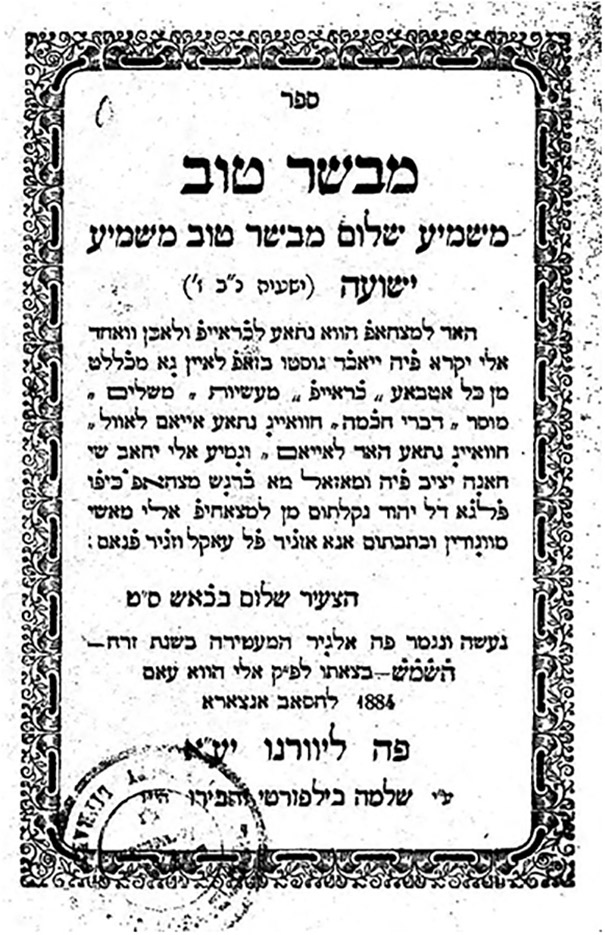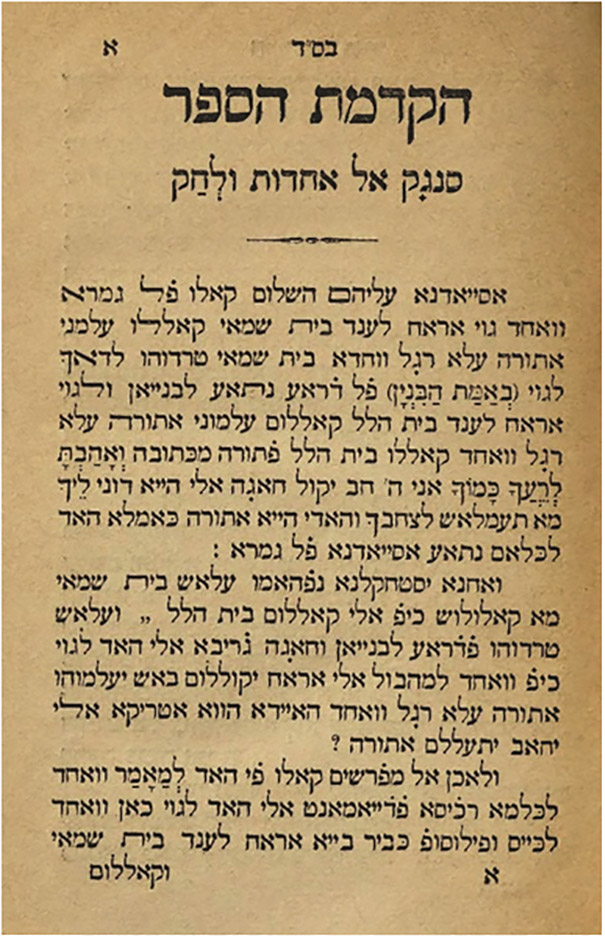Translator’s Introduction
Nationhood, philosophy, girls’ education, money—these are some of the issues discussed in this text by Shalom Bekache (1848–1927), a rabbi, shoh.et (butcher), journalist, publisher, and bibliophile whose life’s trajectory was as meandering as the themes discussed in this text. A native of Mumbai, Bekache was ordained as rabbi in Safed, Palestine, before settling in Algiers in 1878, where he became a prominent voice of the Jewish Enlightenment movement—the Haskalah—and a pioneering figure of Hebrew and Judeo-Arabic publishing in the Maghrib. Having published his first articles in the Hebrew newspapers of Europe, Bekache soon turned to Judeo-Arabic writing in an attempt to spread the word of education, literacy, and piety in the Arabic vernacular spoken by most strata of Algerian Jewish society. With a publishing house, a newspaper, a steady flow of books and dense ties with journals and publishing houses across the Mediterranean, Bekache was a central figure in the coming of Judeo-Arabic political writing.
But who was this man of letters? Through what eyes did he see the seas he crossed—the Arab Sea, the Persian Gulf, the Mediterranean? What traces did the mix of French, Arabic, Spanish, and Hebrew that he heard in Algiers as he was making his way from the old synagogue to his home in the lower Casbah leave in his mind? Vast and bewildering though it must have been, the world in which he lived and sought to find a way had little to do with the identitarian categories with which the readers, writers, influencers, and feedscrollers of the early twenty-first century make sense of their world.1 Looking for traces of introspection in Bekache’s writing seems a futile endeavor. Even the one note about his childhood in Mumbai is laconic, shorn of any adjectives or descriptions that may suggest a narrative of belonging, coming of age, formation. For all the changes and exchanges of Bekache’s life across and between three continents, the coordinates of his intellectual world at first seem so clear and so unquestionable that they require little elaboration. The world that we find reflected through his writing is one where Jewish existence is defined, shaped, and governed by the Torah and the Halakhah, a world of lasting, binding piety throughout and despite two millennia of exile.
And yet uncertainty is everywhere in this text—the preface to Mevasser Tov, a collection of midrashim (exegeses), tales, geographic descriptions, and historical narratives. It is in the very effort to master the locals’ dialect; in its unstandardized grammar, syntax, or spelling; in its repetitions in Hebrew, Arabic, and French; in the erratic use of midrashim and a search for a linguistic register in which to address one’s readers; in the emphasis, time and time again, of the merit and wisdom of the Torah in a land subjected to penetrative, French colonial rule; in the closing sentences, in which Bekache rebukes the members of his congregation for refusing to listen to those wishing to bring to them knowledge and wisdom.
It is this tension between certitude and confusion that I have sought to bring to the fore with this translation of the second half of the preface—and it is this unorganized character of this text that the very act of selection and translation cannot possibly reproduce. In seeking to make this text legible, approachable, I have—consciously but reticently—removed some of its characteristic irregularities. I have omitted repetitions, separated paragraphs into sentences, and added punctuation marks. And by the very act of creating an English translation, I have left out the amalgam of Algerian Arabic, Baghdadi Arabic, Hebrew, Aramaic, French, and Spanish words, phrases, and structures that constituted the textual world of Jewish life before monolingualism.
From The Harbinger of Good
There is no holy nation and there are no righteous people upon the earth like Israel. For after living under foreign nations’ rule in exile without a judge, a sultan, a territory, or a realm of our own, we are not concentrated in one place. […] And, God be Blessed, there are still Jews in the world, and even after almost two thousand years of exile we are still Jews and the Holy Torah is still among us, while other nations who were in the world in early times and ruled the earth have now mixed with other nations and became like them and no trace of them remains. And we, the Jews, also mixed with all other nations and still we remain separate in our spirit and are still Jews. And whoever claims that we mixed with the Christians and that nothing remains that can be called Jewish understands nothing, for the Holy Torah commands us to be “a people who live apart and do not consider themselves one of the nations.”2 Whoever can see clearly will recognize the wonder that for almost two thousand years we are in exile among the nations and still we haven’t mixed with them and are still Jewish and will understand that there is nothing in the world but God, blessed be His name, and will understand that our Torah is still true and valid and her age does not diminish her words, God forbid.
[…]
Of course, we see that there are many people who forgot their religion and have no interest in matters of religion. But the reason for that is the exile, where we live among other nations. And so our knowledge of the Torah is diminished to the extent that people do not know even the blessing of the Torah, and there remains in them no respect for the Torah and no awe before God, blessed be His name. And indeed, several people have said to me, “What is the wisdom of the Torah and where is Her virtue beyond saying ‘this is allowed and this is prohibited, that thing you should do and that thing you shouldn’t do’” […] And that stems from the fact that they do not read the Torah and do not know any of her good and virtue. And especially the girls, who do not read anything in the Torah but read everything in the texts of the Christians, and they say “there is only virtue among the Christians,” and they go on to marry and have children and teach them only the things of the Christians and that is how the Torah and the religion decline.
And while I was in India, I saw there girls and women reading the Torah just like men, in the morning the wife sits down and prays the prayer word for word and the children pray with her, and in the same manner they say the Birkat hamazon after meals3 with their children when they eat and read Hok l’Yisrael4 every day. And the reason is that the rich [Jews] of India have built schools with their money for the sake of the Jews, where both boys and girls learn the Torah and English and so when they leave school they know the Torah […]
And another reason for the decline of our religion is the freedom and liberty brought to us by the Christians.5 Such an effort we make to receive the knowledge of the Christians and achieve liberty that the knowledge of the Torah declines and nothing remains of our religion. Thus said Our Sages, blessed be their memory, in their story about an old man who married a second, younger wife alongside his first wife, and the younger wife tore out his gray hair and only combed his dark hair to make him look as young as her, and the older woman tore out his dark hair and only combed his gray hair so that he looked old like her and so he was left with no hair at all.
And we the Jews are like the man with two wives. On one side is the Holy Torah and our religion, which are like the first, older wife, wanting to strip us of everything related to the Christians, and on the other side are the schools and books of the Christians and the liberty they have recently given us, seeking to strip us of our religion and customs which are with us from olden days, and so we are left alone and do not know how to find our way in the world.
[…]
And in the eyes of many people, there are no philosophers or thinkers in the world except those of the Christians, and our Hakhamim do not know anything about the world, and so I thought I should write in this book a few words from my knowledge to show that our Hakhamim have been thinkers and philosophers before the Christians and before all other nations in this world. And even in these days, God be Blessed, there are among us the Jews great philosophers like those of the Christians […]
And I am amazed how every month we bless Rosh Hodesh6 in the synagogue, saying, “May it be your will to bring us the Hakhamim of Israel, them and their children and all that belongs to them,”7 but when one of them comes to us, we despise and reject him and in order to ignore him, we say, “We do not need you, go out and learn, do not preach at us.” In the synagogue we say a prayer for them to come to us, and in reality we do not understand them. One Jew answered me and told me, “We do not pray for the Hakhamim of these days, but for those of former days.” And he was right in his answer. For indeed, those of the Hakhamim of Israel who lived in former days and passed away, may their memory be blessed, and are now under the earth—for them we pray for God to bring them, even though they are under the earth. […] And may God elevate us from the ignorance in which we are today and lead us to a state as in the sentence “Israel, in which I shall have pride.” And I named this book The Harbinger of Good as in the verse in the Book of Psalms, “he who proclaims peace and brings good,” for I ask God nothing but the peace and good for the People of Israel in its entirety.8
Notes
- Marglin, “Mediterranean Modernity,” 36–40. ⮭
- Quotation from the Book of Numbers, chapter 23, verse 9. ⮭
- The traditional blessing of food. ⮭
- Texts designed for daily or weekly study of the Torah. ⮭
- Bekache uses both the Hebrew ḥerut and the French liberté. Since this is a recurrent pattern, I have chosen to keep the repetition in the translation. ⮭
- The holiday of the Beginning of the Month. ⮭
- From the Blessing of the Beginning of the Month. ⮭
- In fact, the verse is from Isaiah 52:7. ⮭
Works Cited
Marglin, Jessica M. “Mediterranean Modernity through Jewish Eyes: The Transimperial Life of Abraham Ankawa.” Jewish Social Studies: History, Culture, Society 20, no. 2 (2014): 34–68.
Tirosh-Becker, Ofra. “Linguistic Analysis of an Algerian Judeo-Arabic Text from the 19th Century.” La Linguistique 55 (2019): 193–212.


